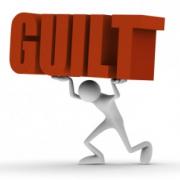
Recently I have been watching a series of television programmes by Derren Brown on Channel 4 in the UK called ‘The Experiments’. Each episode has explored a facet of human nature: the first asked whether it was possible to hypnotise an individual into assassinating a well known celebrity; the second looked at deindividuation and human behaviour when anonymous and in a group; and the third – which is the subject of this blog – examined whether it was possible to get a man to confess to a murder he hadn’t committed. Basically it was about misplaced guilt and it is this, in relation to Bipolar Disorder, that I want to spend some time considering, as it can be an incredibly destructive emotion.
Guilt can be a back-breaking emotion; it can destroy our sense of well-being and in the case of Bipolar it can exacerbate an already debilitating condition. I was diagnosed with Bipolar Disorder 7 years ago but I’ve suffered from it at least from adolescence and quite possibly my whole life and throughout a lot of that time guilt has been a close bedfellow, particularly to the depressive symptoms, which stands to reason. When we are manic we have a different perception of ourselves to when we are depressed. When we are high we are virtually infallible and everybody else is at fault and when we are low we have no self-esteem and are full of self-loathing. Nothing we do is right, everybody else is better than we are and we feel guilty; not only because of the things we’ve done and said when manic but also because we feel worthless due to our inability to lift ourselves out of the depression. It’s a cycle I’ve been through on numerous occasions until I worked out that the guilt I was feeling was misplaced. As a Bipolar sufferer the way I behave and feel when in the throes of an episode is not an act of will but the result of an illness that is ultimately beyond my control. Now, please don’t hear what I’m not saying. I’m not trying to absolve myself of the things I’ve done that transgress moral standards but I am recognising the source of those transgressions and using that to deal with the guilt appropriately so that it isn’t the crippling and debilitating emotion it has been in the past. I’m also not saying that guilt doesn’t have its place. To not feel guilty about things we have done wrong is psychopathic. However, misplaced guilt, when things are not our fault is damaging and starts a viscous circle that is difficult to break. That said, it can still be difficult convincing myself that what I’ve said and done when manic is not my fault when we live in a society that believes we are always in control of our actions and always wants to apportion blame.
In addition to dealing with our own feelings of guilt that come from our actions and words when high and our self-loathing when low there is also the rather difficult problem of dealing with the attitudes of other people, which can just make matters worse. I would imagine, but obviously can’t be certain, that there isn’t a Bipolar sufferer on the planet that hasn’t heard words to the effect of ‘You’re going to have to snap out of it’. Those words were uttered to me by my mother just after I was diagnosed when I was severely depressed. I simply replied, ‘Don’t you think I would if I could?’ but still she touched a nerve. It was something I had been struggling with and yes, felt guilty about. Why couldn’t I snap out of it? What about me meant I was in control of my own brain? Could I, in fact, if I wanted to lift myself out of it and stop inflicting this misery both on myself and those around me? It took me some years to come to terms with the fact that this illness wasn’t my fault and while I could do certain things to help (just like a diabetic controls her diet) I couldn’t ultimately stop my brain from malfunctioning. I’m at ease with that now but haven’t always been and have been susceptible to the things people say. Again, my mother, who said ‘What have you to be depressed about?’ and the nurse on the mental health unit who told me ‘If you don’t think about being depressed you won’t be’ are two examples of misunderstanding that can magnify the already insecure, negative and guilt-ridden feelings a sufferer is feeling. For all those who know someone with Bipolar I would ask that before you say something that implies that they can control it just stop and ask yourself whether they would do something about it if they could? Maybe a lesson could be learnt from my 10-year-old daughter.
A couple of months ago my mood dipped rather seriously and it took a few months adjusting medication to get it stable again. During that time we had a holiday booked to take my children away but because I was ill we couldn’t go. Now, despite what I’ve said misplaced guilt took hold and I felt bad at letting my children down and when I was well enough to have them stay again the first thing I did was apologise for the missed holiday. My daughter simply looked at me and said, ‘It’s ok. It’s not your fault’. Wise beyond her years my daughter was of course right so if you’re involved with someone who has Bipolar, or have Bipolar yourself, while there are certain things we can do to help ourselves (and many of us do) ultimately, when things go wrong, it’s not our fault.

